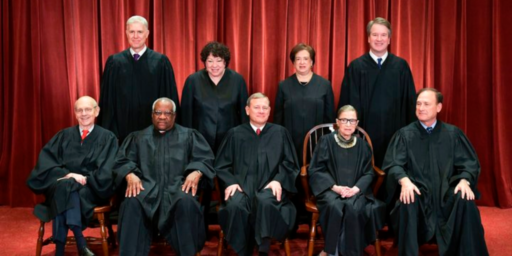Why License At All?
In a rather tortured post about how some companies make profits, Matthew Yglesias makes an aside that just points out the absurdity of licensure laws in general.
When you make it illegal to issue new liquor licenses in Adams-Morgan, you generate monopoly profits for existing license-holders.
[…]
The liquor licenses thing is definitely wasteful—instead of grandfathering certain business in and letting them generate monopoly profits you ought to auction the licenses and let the public capture the regulatory surplus.
I see what Yglesias is getting at, but all I could think of when I read this is “Why stop issuing liquor licenses?” For that matter, why have liquor licenses at all? After all, the laws on the books already make it illegal to sell to people under 21 and in most states limit the age of the people selling the liquor as well. So what’s the need for the license? The same thing goes for other businesses as well. For instance, why artificially limit the number of taxis? Why not let the market find the right level for a particular area? It simply makes no sense for the government to arbitrarily decide how many of a certain type of business there should be. If there are too many, then some will close. If there’s not enough, new businesses will come in.






Great post. I would love to see takeout liquor sales at the local fast-food drivethroughs. Ditto on the taxi thing. Hey! How about the taxi drivers sell you liquor that you can drink when you’re going from one bar to another in Dupont Circle?
In liquor’s case, part of it might be safety concerns – they want to crack down on places that might simply serve liquor until people are dropping dead there of alcohol poisoning, or mix certain things into drinks that might be dangerous.
Of course, I don’t know how much licensing actually helps those – people can just drink themselves to death at home as well, as well as mix bad drinks, and a license won’t stop the unscrupulous.
Who are you and what have you done with Alex Knapp, the reliably commie contributor to this blog?
It’s the same reason that the American car companies are closing profitable dealerships, and the government requires certificates of need for health care facilities, and landfills.
Restricting the supply, increases profits which supports greater regulation.
(Well, slightly different for the car companies because the supply of non-American car dealerships is unaffected, but the profit margins for the remaining dealers are suppposed to rise so that they can conduct more advertising, and do other things besides compete on price)
The limit on liquor licenses relates to the number of inspectors available to maintain routine inspection of them, and the number of policemen available to maintain order at establishments serving liquor and therefore at risk for creating disorder. Taxicab limits has to do with inspection and the need to avoid crowding at hotels and airports where they gather waiting for fares.
In a word: externalities.
Because of noise, etc. people want to limit the number of establishments serving liquor in their neighborhood or limit the precise locations, etc., etc.
That’s always the excuse, isn’t it? Laws designed to save us from ourselves are usually the most grotesque example of government takeover.
Face it, this is another example of it all being about government controlling our lives.
And mark this down on your cal files, kids… for the first time in as long as I can recall, I’m sitting here reading an Alex post and nodding and smiling.
And Alex… to you, I’ll point out that such a question is one Yglesias will never address.
To a certain extent I think the requirement for licensing certain business speaks to the benefit of commercial planning. When it comes to the distribution of certain services such as the selling and consumption of alcohol the public and by extension the government have an interest in controlling who can sell and in what circumstances. For example, whether or not the market will support it, we might frown upon Toys-R-Us selling package liqour side by side with action figures.